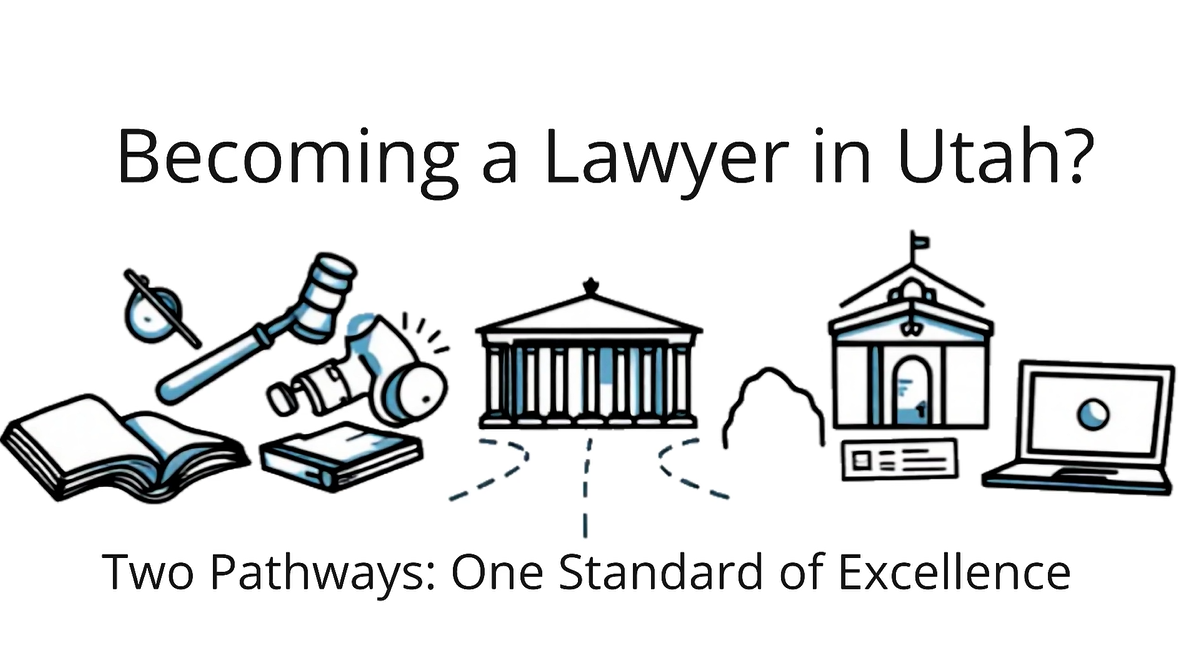PRESS RELEASE
SALT LAKE CITY (October 1, 2025) – The Utah Supreme Court has approved a groundbreaking rule (Rule 14-703A) creating an Alternate Pathway to Attorney Licensure, administered by the Utah State Bar. This newly adopted option is offered starting next year and is a skills-based, practice-ready route for law school graduates to become licensed attorneys. It complements the existing bar exam format with a pathway that reflects the evolving needs of both the profession, and the public.
The Bar Admissions Working Group, established by the Utah Supreme Court, was tasked with exploring alternatives to the traditional bar exam for assessing competence to practice law in Utah. In response to growing national and local calls for a licensure model that better reflects real-world skills, reduces economic barriers, and supports workforce readiness, the group developed an alternate pathway to admission. The Working Group is made up of 15 members representing a cross-section of Utah’s legal community, including judges, practitioners and academics.
“We are pleased to offer an alternate path for licensure,” said Utah State Bar Executive Director Elizabeth Wright. “We were keenly aware that one size doesn’t fit all, and providing an option equips those who excel outside of a traditional exam with practical skills for a successful career in the legal profession.”
Applications for the skills-based licensure model open January 1, 2026. Among the requirements for the program are:
- 240 hours of supervised legal practice under a qualified attorney,
- Law school required skills coursework,
- A written performance exam administered by the Utah State Bar.
This method is backed by growing empirical research indicating that skills-based assessments are more effective at predicting future success in legal practice than standardized tests alone. Jurisdictions exploring similar models have reported that practice-based pathways produce attorneys who are more confident, better prepared and client-focused from day one.
Critically, the alternate pathway does not lower licensure standards. Instead, it modifies the way competence is demonstrated, preserving rigor while enhancing relevance. The combined hands-on training and coursework exceed many traditional prep timelines, offering deeper engagement with real legal work.
“This is not about making it easier to become a lawyer,” said Utah Supreme Court Associate Chief Justice, and Working Group Chair, John A. Pearce. “It’s about making it smarter. This option gives graduates a financially viable way to begin practicing law without months of unpaid studying and the potential of thousands of dollars in prep costs. The Utah Supreme Court is convinced that this path will produce attorneys who are better prepared to immediately practice law.”
The alternate pathway does not replace the Uniform Bar Exam (UBE) or the forthcoming NextGen Bar Exam, which Utah will administer beginning in July 2028. Rather, it offers choices so candidates can pursue the pathway that best aligns with their learning style, financial situation and career goals.
During the public comment period in late 2024, the judiciary received 103 submissions. Many praised the pathway’s emphasis on real-world legal service, which enhances public protection and access to justice.
As more jurisdictions evaluate licensure reform, Utah is positioned at the forefront of this national conversation. While some states still tie admission by reciprocity to bar exam passage, others accept years of practice in lieu. With this alternate pathway, Utah graduates can start gaining that experience immediately, positioning them for broader opportunities in the years ahead.
About the Utah State Bar
Established in 1931 under the authority of the Utah Supreme Court, the Utah State Bar regulates and supports over 12,000 attorneys statewide. The Bar is dedicated to advancing a justice system that is accessible, fair, and effective, while equipping legal professionals with the tools and training to serve the public with excellence.
###
CONTACT
Jennifer Weaver – Communications Director
Utah State Bar
Office: 801-746-5237 Cell: 385-329-3558
jweaver@utahbar.org
